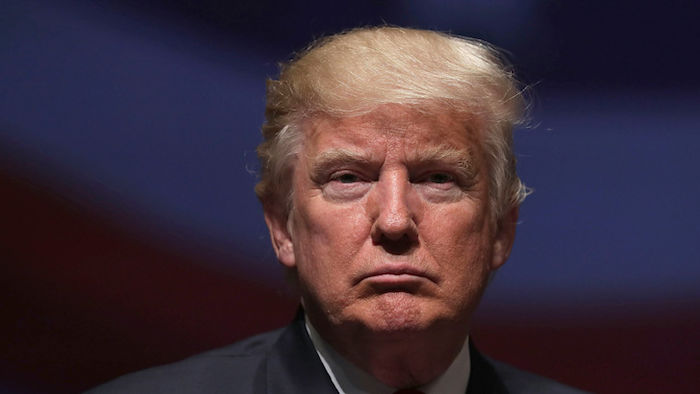What it could mean for Australia if Trump is re-elected
By Annette Sampson
Regardless of who wins in November, Australia won't escape the fallout from the presidential election, writes Annette Sampson.
Can lightning strike twice?
It would be a brave punter who ruled out US President Donald Trump after the failure of the polls to predict the outcome of the last presidential election.
In late August, most pundits still had the Democratic candidate, Joe Biden, in the lead but the margin was narrowing and Trump's voting base was out and rallying behind him.
Left-wing filmmaker Michael Moore, who correctly called a Trump win in 2016 in key battleground states, has warned of a repeat in 2020 with enthusiasm for Trump "off the charts" in key areas.
On the face of it - a poor response to the COVID-19 pandemic, civil unrest over racism and pandemic restrictions, and a weakening economy - you might assume Trump was down and out. But he is a master salesman and has been going hard on "law and order" and the fear factor of a "radical socialist" Biden administration.
Key differences
Many people, especially those in US-allied countries like Australia, see Biden as a steady hand on the wheel after the unpredictability and erratic behaviour of the Trump presidency. Biden has described himself as a "transition candidate" acting as a bridge to a younger generation of Democratic leaders as opposed to Trump who has jokingly (we assume) encouraged supporters to call for 12 more years rather than the permitted four.
Trump has delivered what he promised: a non-conventional presidency. Biden has been in politics since 1972, served as vice-president for eight years and, according to The New York Times, is "seeking to cast himself as a steady, seasoned hand in a dangerous and uncertain world".
Policy changes
Analysis by fund manager Fidelity says it is Joe Biden who is actually the change candidate, threatening to shake things up, while Trump will provide a continuation of the status quo. It expects the key policy differences to be in tax, regulation and climate change while the aggressive US stance against China will likely remain whichever candidate wins office.
Biden wants to reverse some of Trump's tax cuts for higher earners and raise the minimum wage as well as increase the minimum tax on offshore profits.
He wants to rejoin the Paris climate agreement and commit the US to reaching net zero emissions by 2050, led by a plan to create jobs by manufacturing "green energy" products. He has proposed to spend $US2 trillion ($2.75 trillion) in his first term and to achieve 100% clean electricity by 2035.
Analysis published by the United States Studies Centre (USSC) at Sydney University predicts a Biden administration would pursue a less isolationist approach to international trade and restore US commitment to institutions such as the World Trade Organisation, both of which would be good for Australia. However, this is qualified by his "Buy America" program, which pledges federal money to buying local goods.
Implications for Australia
Like him or loathe him, the US economy did well under Trump until the pandemic hit. Since the outbreak he has signed legislation to pump trillions of dollars into the economy and supports further measures such as a payroll tax cut. Sharemarkets have responded well to this stimulus, seemingly at odds with the broader economy.
According to David Uren in the USSC analysis, the correlation between US and Australian economic growth has slipped during the past two decades as Australia has become more integrated with Asia. However, he says in general it is still true that what is good for the US is good for us.
He says we are more at risk from US trade policy as we lack unilateral negotiating power and depend on organisations such as the World Trade Organisation to set the rules. He says unilateral US deals, such as its Phase 1 deals with China, have already worked against us with the US likely to gain barley sales at Australia's expenses, with LNG and bean exports to China also vulnerable.
The pandemic remains a key economic issue no matter who wins government, with Biden indicating he is more likely to follow health advice on issues like lockdowns than Trump, who prioritised opening up the economy. With the US one of the countries worst affected by the virus, the next president will face a dual challenge of addressing the health situation while keeping the economy going.
The other great challenge for the victor will be addressing the deep divisions that have emerged in US society.
Did you know
Joe Biden first ran for president in 1987. He tried again in 2008 and considered running in 2016, but was persuaded by President Obama that Hillary Clinton had a better chance of winning the election. Until this year, he had won zero presidential nominating contests, according to Politico, a political news outlet in the US
Best-case scenario
Research last year found only one in five Australians wanted a Trump win. As an ally, certainty and predictability are important for Australia although we have largely stayed under the Trump radar.
Worst-case scenario
Hawkfish, a data firm backed by billionaire Michael Bloomberg, has raised the prospect of a "red mirage" on election night where Trump could appear to win on election night only to have that result overturned days or weeks later due to mail-in voting. What happens if he claims victory early or, having undermined the credibility of postal voting for the past few months, claims electoral fraud?
The wild card
Whoever is elected, managing the fallout from the pandemic will be critical to their success or failure. How challenging this will be in part depends on when, or if, a successful treatment or vaccine becomes available.
Get stories like this in our newsletters.



